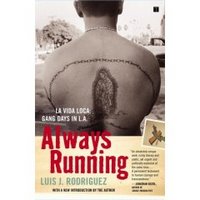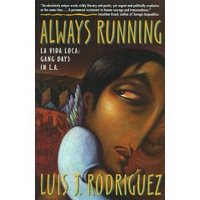

Just finished discussing Luis J. Rodríguez’s book Always Running in class this week. But it’s not like we could ever finish discussing the issues raised in this beautiful, complex book.
This book reminds me how easy it is to neglect all members of our communities... how easy it is to write off children. How easy it is for politicians and institutions and adults to write off "undesirables" of all ages. How easy it is to see a young vato and think that kid is angry, messed up, and he better just stay the hell away from me and my family. A disruption in class. A kid who needs to go to boot camp.
How many young adults who usually don't like to read have asked to borrow a copy of Always Running? How many youth have stolen Always Running from the libraries because they want to read it and keep it because it speaks to them?
I wish more of the students I taught in the detention center went to college. I wish more of them were in my college classes. The two ex-gang members in my class at the community college last semester were some of the best students because they had something to say--they had a lot to write about and they helped to make class discussions engaging because many of the issues we discussed hit close to home. They were also some of the most concerned about the anti-immigration legislation and were involved in organized, peaceful protests.
A high school teacher told me they've had four pep rallies for the football team this year at his school—-a predominately low income, Chicana/o student body. The only four times they have met this year as a school. How the cheerleaders performed their routines facing the team... routines just for those boys.
He says the football players and cheerleaders, generally speaking, seem like nice kids and the whole role-playing for these popular positions seems, in his opinion, unnatural to many of the students. On the other hand, the pep rallies are not mandatory, but still over a thousand show up before school starts.
Have we become so cliché that we cannot ever escape it?
Preparing children to either be literal soldiers or cheering for soldiers.
Why not a gathering to discuss social justice issues? To hear spoken word poetry? To watch dance teams perform beauty for its own sake without the cheering? Band members playing music they like instead of the same ole patriotic tunes? Football players on the field and not always catered to off of the field. They have their stage already--promote stage space and creative opportunities for others.
We also talked about an article that described how gang members make good U.S. soldiers. How it’s much more than tagging in Iraq. When it’s convenient for the government to promote gang activity and violence if it advances the government's purposes.
And yet important books like Always Running have been banned in Texas and other states, primarily on the grounds of a couple 'explicit' sex scenes (not so much because of the violence). Are parents really worried that the book will encourage their kids to have sex? What world do they live in?
Lee Rhyanes has a great interview with Rodríguez. I like how Rodríguez reiterates that books don’t encourage kids to have sex, it’s hormones.
Gang members aren't only gang members because they may come from stressed out and/or broken families. It's time we stop blaming parents for all that goes wrong with children and start looking at the double standards institutions promote. State-mandated testing, football is king, overcrowded classrooms, the same ole history books, the same ole alamo, the lack of arts funding, the same ole abstinence only, the same ole books in literature class, the same ole structure to write your same ole essay that sounds like everyone else's in order to pass uncle sam's exam. The same ole cops using their batons when no one's looking. The same ole kids locked up because of the same ole drugs that someone with a lawyer uses just the same but never gets locked up. The same ole fraternities using the same ole hazing with lots of daddies and alumni power on the corporate breeding grounds backing em up. The internalized racism that's promoted by a host of many factors, dividing the Mexican American community. Class divisions and the pull yourself up by the bootstraps--we did--mentality.
The same ole cheerleading and cronyism that encourages the total destruction of Chicana/o communities via eminent domain and forced relocations to build more shopping malls. The same ole let's push these folks aside, either to another neighborhood, alternative school, jail, country, and we'll get to shop for our next outfit for the next football game in paz. We'll be so progressive in our shallow utopia that doesn't include anything 'ugly' or 'negative' because we are the progressive former cheerleaders and football players in town (or former high achievers neglected socially in school who now want a piece of the pie). Don't you know we know what's best and trendy? We went to the best colleges, we have our law degrees, we know the best books to read that will show us how to become the creative class. How dare you criticize us! We are the 'progressives' and you only want to maintain the status quo. No matter what you say we will eat you alive because we have money and cronyism on our side.
Are we all clichés or archetypes. Predictable. Is it love or pain that drives the cat to eat strands of grass shoots as if a dna command. Censorship of books is a censorship of life. I grew up censored. Didn't we all. The most tragic part of it all is that we censor the very life that is who we are. Language is our working through. Without it, for fear of its acknowledgement, is the very tragedy that we experience daily. As children, as adults. Children afraid of the adult's judgment and the adult's fear of the child's thoughts and power. Children are powerful. They are very powerful. It is time we start respecting their power by helping them access the language that will help them articulate and solve the big mess that they have inherited from us, a fearful people that is the U.S. of America.
Perhaps it is naive of me to think that language will set us free, when language, as a comfort and as a transcript of intellect, continues to be abused and used as an oppressive weapon. It is a shame that intelligent people continue to dumb down the written word--political campaigns and some local newspapers come to mind--for what they consider easy coersion. I want to know... are they always laughing when not b.s.-ing? Laughing, as cops might, after shoving a kid with a dime bag around and letting him free with a physical warning. Laughing, as politicians must, after their big "morality" speeches that have little to do with their elected positions or their own beliefs.
We live in a world that thrives off of censorship for fear that the everyday person in the crowd snaps out of the coersion and realizes that "winning" a football game, new place to shop, or violent war will not set him free.
If more young people wrote their life stories, especially those who are living la vida loca as many still call it, I can imagine that it would only increase their understanding of themselves and the complex factors behind their choices. Similarly, when we read their stories, we learn more than we can imagine. In my experience teaching incarcerated youth this past year, I learned that the amount of substance abuse is alarming, as is the amount of violence they have witnessed and/or experienced. In my experience reading their writing and talking to them, the amount of love, pride, and hope these young people have to offer is not only life-affirming but also a testament to their creative potential, which theoretically should extend far beyond cell walls, but is one of the greatest challenges all communites face.
With all of my respect for community activists like Lee who work with young people, and for writers like Rodríguez and raulsalinas who have made it their life mission to reach out through the written and spoken word, through teaching and healing, through the promotion of young voices who have something to say and a need to say it. I hope that more people will want to listen.
5 comments:
You are so right (on), Emmy. Bravo.
thanks for reading this long entry, lee. gracias.
thank you Emmy for posting on this book and for linking the interview. I'm not sure what kind of work I'd be doing had it not been for this book. it introduced me to a lot of projects and people, including you and the work you built with the Delta youth. definitely grateful to have read this book and to have had the opportunity to build with you and the youth at Delta. thank you.
I need to thank you, Lecroy, for making this interview available online--you ask excellent questions that show your deep concern for the subject matter and LR's work. Thank you too for keeping the youth project going in EPT--I can't tell you how grateful I am to you for your efforts and your work. The beats can't be beat--the world needs more teachers like you who know what's up and how to reach the youth through music, poetry, and understanding.
thanks emmy. alas, i had to write an entry about censorship in wisconsin, which (aside from mccarthy and the -ism named for him) i had alway thought was more progressive and educated than texas. it now appears that i am wrong, now.
Post a Comment